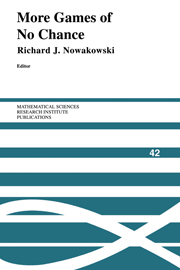Book contents
- Frontmatter
- Contents
- Preface
- The Big Picture
- Idempotents Among Partisan Games
- On the Lattice Structure of Finite Games
- More Infinite Games
- Alpha-Beta Pruning Under Partial Orders
- The Abstract Structure of the Group of Games
- The Old Classics
- Higher Nimbers in Pawn Endgames on Large Chessboards
- Restoring Fairness to Dukego
- Go Thermography: The 4/21/98 Jiang-Rui Endgame
- An Application of Mathematical Game Theory to Go Endgames: Some Width-Two-Entrance Rooms With and Without Kos
- Go Endgames Are PSPACE-Hard
- Global Threats in Combinatorial Games: A Computation Model with Applications to Chess Endgames
- The Game of Hex: The Hierarchical Approach
- Hypercube Tic-Tac-Toe
- Transfinite Chomp
- A Memory Efficient Retrograde Algorithm and Its Application to Chinese Chess Endgames
- The New Classics
- The 4G4G4G4G4 Problems and Solutions
- Experiments in Computer Amazons
- Exhaustive Search in Amazons
- Two-Player Games on Cellular Automata
- Who Wins Domineering on Rectangular Boards?
- Forcing Your Opponent to Stay in Control of a Loony Dot-and-Boxes Endgame
- 1 x n Konane: A Summary of Results
- 1-Dimensional Peg Solitaire, and Duotaire
- Phutball Endgames Are Hard
- One-Dimensional Phutball
- A Symmetric Strategy in Graph Avoidance Games
- A Simple FSM-Based Proof of the Additive Periodicity of the Sprague-Grundy Function of Wythoff's Game
- Puzzles and Life
- The Complexity of Clickomania
- Coin-Moving Puzzles
- Searching for Spaceships
- Surveys
- Unsolved Problems in Combinatorial Game Theory: Updated
- Combinatorial Games: Selected Bibliography With A Succinct Gourmet Introduction
The Abstract Structure of the Group of Games
Published online by Cambridge University Press: 29 May 2025
- Frontmatter
- Contents
- Preface
- The Big Picture
- Idempotents Among Partisan Games
- On the Lattice Structure of Finite Games
- More Infinite Games
- Alpha-Beta Pruning Under Partial Orders
- The Abstract Structure of the Group of Games
- The Old Classics
- Higher Nimbers in Pawn Endgames on Large Chessboards
- Restoring Fairness to Dukego
- Go Thermography: The 4/21/98 Jiang-Rui Endgame
- An Application of Mathematical Game Theory to Go Endgames: Some Width-Two-Entrance Rooms With and Without Kos
- Go Endgames Are PSPACE-Hard
- Global Threats in Combinatorial Games: A Computation Model with Applications to Chess Endgames
- The Game of Hex: The Hierarchical Approach
- Hypercube Tic-Tac-Toe
- Transfinite Chomp
- A Memory Efficient Retrograde Algorithm and Its Application to Chinese Chess Endgames
- The New Classics
- The 4G4G4G4G4 Problems and Solutions
- Experiments in Computer Amazons
- Exhaustive Search in Amazons
- Two-Player Games on Cellular Automata
- Who Wins Domineering on Rectangular Boards?
- Forcing Your Opponent to Stay in Control of a Loony Dot-and-Boxes Endgame
- 1 x n Konane: A Summary of Results
- 1-Dimensional Peg Solitaire, and Duotaire
- Phutball Endgames Are Hard
- One-Dimensional Phutball
- A Symmetric Strategy in Graph Avoidance Games
- A Simple FSM-Based Proof of the Additive Periodicity of the Sprague-Grundy Function of Wythoff's Game
- Puzzles and Life
- The Complexity of Clickomania
- Coin-Moving Puzzles
- Searching for Spaceships
- Surveys
- Unsolved Problems in Combinatorial Game Theory: Updated
- Combinatorial Games: Selected Bibliography With A Succinct Gourmet Introduction
Summary
ABSTRACT. We compute the abstract group structure of the group Ug of partizan games and the group ShUg of short partizan games. We also determine which partially ordered cyclic groups are subgroups of Ug and ShUg.
As in [2], let Ug be the group of all partizan combinatorial games, let No be the field of surreal numbers, and for G in Ug, let L(G) and R(G) be the Left and Right sections of G, respectively. If L(G) is the section just to the left or right of some number z, we say that z is the Left stop of G, and similarly for R(G) and the Right stop. Let ShUg be the group of all short games in Ug; that is, ShUg is the set of all games born before day a;, or of all games which can be expressed in a form with only finitely many positions. For games U and integers n, we write
Also, recall from [1, Chapter 8] the definition of Norton multiplication, for a game G and a game U > 0:
Here, GL, GR, UL, and UR range independently over the left options of G, right options of G, left options of U, and right options of U, respectively. To define G.U, we must fix a form of G and sets of Left and Right options for U.
We will say that a subgroup X of Ug has the integer translation property if it contains the integers and, whenever either Left or Right has a winning move in a sum A1+…+An of games from X, not all integers, he also has a winning move in an Aj which is not equal to an integer.
Lemma 1. The real numbers have the integer translation property.
Information
- Type
- Chapter
- Information
- More Games of No Chance , pp. 49 - 58Publisher: Cambridge University PressPrint publication year: 2002
